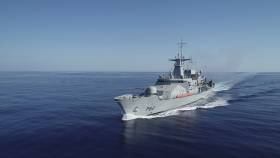Displaying items by tag: Staff Shortages
Naval Vessels in Service to Be Docked by Staff Shortage
A tie-up of two ships in port indefinitely is planned by the Naval Service due to a deepening manpower crisis. Of the three services in the Defence Forces, the naval service is suffering the most from a haemorrhage of personnel for better paid jobs in the public sector.
The Irish Examiner has learned that the nine-ship fleet will be reduced to seven as the navy’s flagship, LÉ Eithne, and coastal patrol vessel LÉ Orla will be taken off operational duty for the foreseeable future. Despite her age, LÉ Ciara, which was purchased from the British in 1988, is to remain on patrol.
Ideally, the navy’s newer P60s — LÉ Róisín, LÉ Niamh, LÉ Samuel Beckett, LÉ James Joyce, and LÉ William Butler Yeats — should each have a crew of 50, but are normally operational with 45. Sources in the naval service have indicated the manpower crisis had often led in recent times to them sailing with crew numbers as low as 34.
Both the LÉ Eithne and LÉ Ciara were due for major refits, but according to a source will receive “minor maintenance to achieve a certain readiness level” in the event they need to be redeployed during a major emergency.
In a statement, the Defence Forces press office said Flag Officer Commanding the naval service, Commodore Michael Malone, was “currently managing the consolidation of naval service assets”. This was “due to ongoing personnel challenges and to Óglaigh na hÉireann’s commitment to valuing its personnel, their welfare and safety”.
Read more on this story by clicking the link here.
Tánaiste Rules Out Naval Service Suspending Mediterranean Role
#NavalService - The Tánaiste Simon Coveney has ruled out suspending Ireland's Naval Service involvement in the Mediterranean migrant rescue mission and bringing crews home to deal with staff shortages.
As The Irish Times writes, Independents4Change TD Clare Daly claimed “the service is in meltdown”, said that for the first time in its history the service was unable to do its core function of sea fisheries protection.
She suggested it was time suspend the State’s participation in Operation Sophia and bring staff home to “protect our sea fisheries and coastal waters”.
She was commenting after it emerged that senior Naval personnel were ordered to end the 72 hours notice personnel normally got to provide short-term relief on ships and that personnel would have to be ready for duty without warning.
The order was subsequently rescinded.
The Dublin Fingal TD said that ships normally crewed by 44 personnel were putting to sea with 34 and she asked if it was time to bring the crew members home from Operation Sophia.
For further reading on Operation Sophia, click the link to the newspaper here.





























































